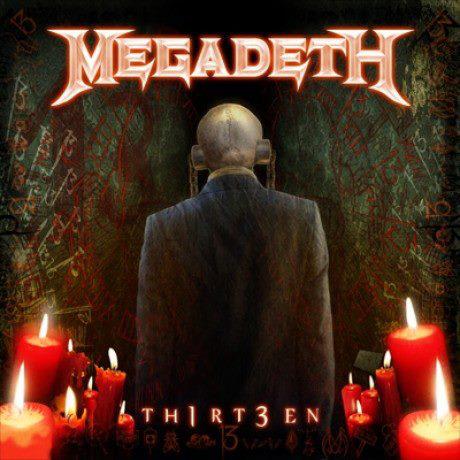
Album Review: Megadeth - "Th1rt3en"
"Th1rt3en," the latest offering from heavy metal titans Megadeth, is both a study of what Megadeth has been and could be. It is a self-contained road-map of Megadeth's past aggressions, present explorations and possible future.
Chris Broderick and Dave Mustaine combine again, just as they did on "Endgame," to again rewrite the book on combined guitar. Megadeth, relative to their thrash cousins, has always capitalized on the power and versatility of the guitar both as metal icon and principal instrument. Beginning with "Sudden Death" at the top, the duo rips solos back and forth one on top of another, infusing the album with the signature Megadeth feel. For all the changes and experiments over the years, Megadeth has always been the show piece for how to shred on a six string.
It is likely that this paragraph could be copied and pasted from every Megadeth album review ever written by anyone, but here goes, just for the record. Dave Mustaine remains a below average vocalist and a sub-par lyricist. The messages on "Th1rt3en" range between blase and clumsy, as the narrative is at best simple and at worst crude. Not crude in a vulgar sense, but crude in the way the lyrics handle metaphor and language. At this point in that career, Megadeth doesn’t even lose points for that anymore. Now with that out of the way...
The highlights of "Th1rt3en" come in the moments when it sounds as though this album could have immediately followed "Rust in Peace" in Megadeth's discography. It is in these moments when the progression of Megadeth over time is most evident and most complete. Listen to "Never Dead" and "New World Order" right in the middle of the album, and memories of the old halcyon days of Megadeth will come flooding back in complete detail. The two cuts beat forward with rhythmic consistency, allowing the album’s heartbeat to accelerate mostly through snare and guitar.
Before we all get too excited over a perceived return to the good ole’ days, one should note that Dave Mustaine has admitted that some of these songs were composed during other stages in his career. That doesn’t make the songs have any less impact, but it does shed some light as to why parts of “Th1rt3en” sound like “Peace Sells…” parts sound like “Rust in Peace” and parts sound like “Countdown to Extinction.” As a revival of those ideas the album is a smashing success, as “We the People” and “Sudden Death” are laced with the kind of punctuation as “Symphony of Destruction,” and “Public Enemy No. 1” is akin to “Hanger 18.”
So where does the rest of the album come from? "Whose Life (Is it Anyways?)" and “13” represent an interesting trend on the album, and perhaps we're going into shark-infested territory here. This song and a small handful of others showcase an airiness and open-ended soloing that is indicative of the recent sound of...brace for it...Metallica ("Lulu" notwithstanding.) Now, there are certainly those who would argue that all Metallica songs are actually cousins to old Megadeth riffs, and for a couple albums that was true. Still, it seems harder to make that point in 2011, and so what might be seen as Megadeth bending toward the larger act's sound could be anathema for some. Make no mistake; that DOES NOT MEAN these are bad songs. Quite the contrary, as “13” features some of the album’s best pure construction, and “Wrecker” is an adrenaline-infused, galloping good ride.
Other than that, there are cuts which continue Megadeth’s new millennium trend in songwriting, focusing on beat and measure more than pure shredding (think: “44 Minutes.”) With the exception of the usual melodrama, the only poor decision on the album is the yawningly pedantic “Fast Lane,” which was done better by Annihilator in 1994 with “Second to None.”
“Th1rt3en” remains a curiosity, and in truth, is a good album. There’s something about the scattershot nature of the songs, likely a product of their separate composition periods, that makes the album a matter of specific taste. It is unlikely that every fan will love every song or style on “Th1rt3en.” Still, for Megadeth fans, this is a more than worthwhile addition to your burgeoning collection. It is a good album, although perhaps not a transcendent one.

